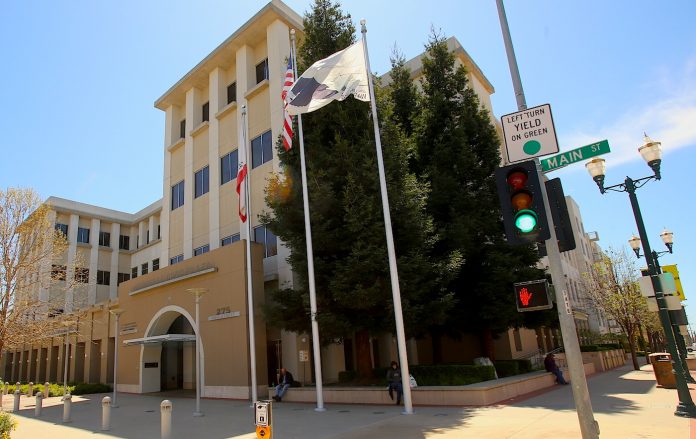WATSONVILLE—In a bizarre ending to a Tuesday night public meeting that puzzled and agitated a majority of the Watsonville Planning Commission, the body gave no recommendation on whether a Watsonville charter school should be allowed to continue to operate in an industrial zone on the outskirts of the city.
The commission voted 3-2 to approve a plan that would allow Ceiba College Prep Academy to stay at its 215 Locust St. location, but the motion failed because it needed a majority of the body—four of seven commissioners—to vote in favor. One commissioner was absent and another seat is currently vacant.
Typically, when an item fails in a planning commission meeting it is considered a recommendation against the item and would move to the city council with a recommendation from the commission to deny the project. However, Watsonville Community Development Department Director Suzi Merriam said that her staff did not prepare the needed evidence or a resolution to support the denial of the project—something her staff usually does—because they did not anticipate the item would be controversial or that the commission would vote against it.
“We did not receive community feedback until this week,” Merriam said when asked why staff did not prepare the needed documents.
As the commission wrapped up its deliberations and prepared to vote, Merriam and other city of Watsonville staff seated next to the commissioners began to speak to one another. Then, Merriam reached over to speak to commission chair Jenni Veitch-Olson, who was seated to her left.
Veitch-Olson, just before the commissioners were set to vote, then said that instead of voting the body should continue the item to its May meeting because staff did not prepare the documents needed to support the denial of the project.
Commissioners Daniel Dodge, Sr.—a former Watsonville mayor and city councilman—and Ed Acosta—a member of the County Office of Education’s Board of Trustees and a candidate for county supervisor—then lambasted staff for being unprepared and accused them of “counting votes,” or predicting how a commissioner would vote before the question is called.
“I’ve been through hundreds of these meetings, thousands. I find this embarrassing,” Dodge said.
Added Acosta: “This is appalling what you guys are doing over here. You guys are carrying on a conversation on the side about what you’re going to do, trying to slow things down. We have a motion on the table. That’s not transparency.”
Commissioners Lucy Rojas and Dodge and chair Veitch-Olson voted in favor. Commissioners Acosta and Anna Kammer voted against it.
The end-of-meeting sequence dwarfed the conversation about the school’s location.
Ceiba moved into the big box building—previously a DHL shipping station—in 2013 to bring the school’s 520 or so students under one roof. The plan was for the school to use the building as a temporary site while it looked for a permanent location.
But school officials now want to stay there for good, a move that would require Watsonville City Council to make an amendment to the city’s general plan and rezone the lot from its current industrial use.
Ceiba Head of School Josh Ripp in a presentation to the commission said that students at the charter—established in 2008—are far outperforming those at public schools both locally and across the nation. That is a result, he said, of the small learning environment the campus provides.
But neighbors who live on the streets surrounding the school say that while it is doing a phenomenal job of preparing youth for success, having the campus there has been a nightmare for the community. They say that Locust Street and its connecting streets, for example, are often flooded with traffic as parents bring and pick up their children from class. Many times, neighbors wrote to the commission in letters submitted on Monday, driveways to their homes are blocked off for more than an hour in the morning and afternoon.
Some neighbors also said that Ceiba students often litter on their lawns, and that they and their parents have been aggressive toward neighbors when asked to not block their driveways.
Most of these concerns, neighbors say, have been ignored by the school and the city.
Approval for the school to continue operation at the site would come with nearly 50 “conditions of approval,” or benchmarks that the school would have to meet in the near future. These include floodproofing the campus, expanding its carpooling program, updating its sanitation efforts and upgrading several crosswalks around the school.
But neighbors and some commissioners were skeptical that the school would make these improvements, or if they would have any impact on the issues surrounding the campus.
The item will likely go before the city council in the coming weeks.










